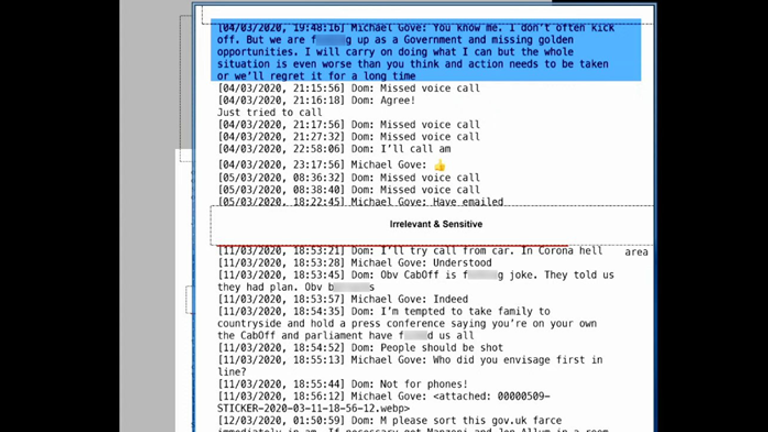Michael Gove has apologised for government mistakes during the pandemic, saying the UK was too slow to enter lockdown in early 2020 and then again in the autumn when the virus resurged.
However, he defended Boris Johnson against claims of dithering and dysfunctionality, telling the official COVID inquiry that restricting people’s freedoms went “deeply against his instincts” and there were no easy decisions to be made at the time.
Asked by lead counsel Hugo Keith KC what the government failures were, Mr Gove said: “I believe that we were too slow to lockdown initially in March (2020). I believe we should have taken stricter measures before we eventually decided to do so in late October.”
COVID inquiry live updates
He added that testing should have been more rigorously thought through, there was not enough focus on the impact on children and there were errors with the procurement of personal protective equipment.
Mr Gove said this was not an exhaustive list and the UK was “certainly not well enough prepared” for the unfolding pandemic in March 2020.
The levelling up secretary accepted he “should definitely have been more forthright” in pushing for a lockdown sooner and he took some responsibility for the “mistakes” made at the top level of politics
He told the inquiry: “If I may… apologise to the victims who endured such pain, the families who endured so much loss as a result of the mistakes that were made by government in response to the pandemic.
“As a minister responsible for the cabinet office, and was also close to many of the decisions that were made, I must take my share of responsibility for that.”
Gove warned Cummings ‘we will regret not taking action’
Mr Gove’s frustration at the time at the handling of the pandemic was clear in a sweary WhatsApp message shown to the inquiry to then-chief aide Dominic Cummings on 4 March.
He said: “You know me, I don’t often kick off but we’re f****** up as a government and missing golden opportunities.
“I will carry on doing what I can but the whole situation is even worse than you think and action needs to be taken or we will regret it for a long time.”
Asked to expand on this, Mr Gove told the inquiry he was concerned overall about the cabinet office, for which he had recently taken on responsibility, including its ability to deal with COVID.
He said the department was “flawed” and not equipped to deal with a crisis.
But he also defended his conduct and that of his colleagues, saying: “I want to stress that I and those with whom I worked were also seeking at every point, in circumstances where every decision was difficult and every course was bad, to make decisions that we felt we could in order to try to deal with an unprecedented virus and a remarkable assault on the institutions of the country.”
Lockdown ‘against Boris Johnson’s world view’
Despite his long-standing rivalry with Mr Johnson, he also defended his foe against accusations repeatedly levelled during the inquiry that the former prime minister could not make a decision and Number 10 was mired in chaos.
Asked about WhatsApp messages by Cabinet Secretary Simon Case saying working with Mr Johnson’s team was like “taming wild animals”, he said that while there were “strong personalities” in Downing Street at the time, “you will always have – it’s in the nature of politics – strong views, sometimes punchily expressed”.
On Mr Johnson’s apparent oscillating over lockdown, he said: “It’s not that he found the decision-making difficult, it is that a decision to restrict freedoms in an unprecedented way went against his instincts.”
He said the then-PM had a “principled attachment to maximising individual liberty” which meant “restricting free association” was “deeply difficult” and against his “world view”.
‘Too much asked’ of Matt Hancock’s department
Mr Gove also said he had a “high opinion” of former health secretary Matt Hancock, who has faced repeated criticism from a number of witnesses before the inquiry.
Previous hearings have heard the country’s most senior civil servant at the time, Lord Sedwill, wanted Mr Hancock to be sacked, as he displayed “nuclear levels of overconfidence” and had a habit of saying things that were not true.
But Mr Gove said “too much was asked” of Mr Hancock’s Department of Health and Social Care at the start of the pandemic and that other parts of government should have taken on more.
Read more:
‘We look like a joke’: Key WhatsApps from inquiry
Johnson suggested he thought COVID was ‘nature’s way of dealing with old people’
The senior MP at one point noted there was a significant body of judgment that believes COVID was “man-made”, only to be told by Mr Keith the “divisive” issue was not part of the inquiry’s terms of reference.
Former deputy chief medical officer Professor Dame Jenny Harries will give evidence later on Tuesday.
Later this week, Lady Hallett’s probe will also take evidence from Mr Hancock and ex-deputy prime minister Dominic Raab.
The inquiry is taking evidence as part of its second module on core UK decision-making and political governance.

